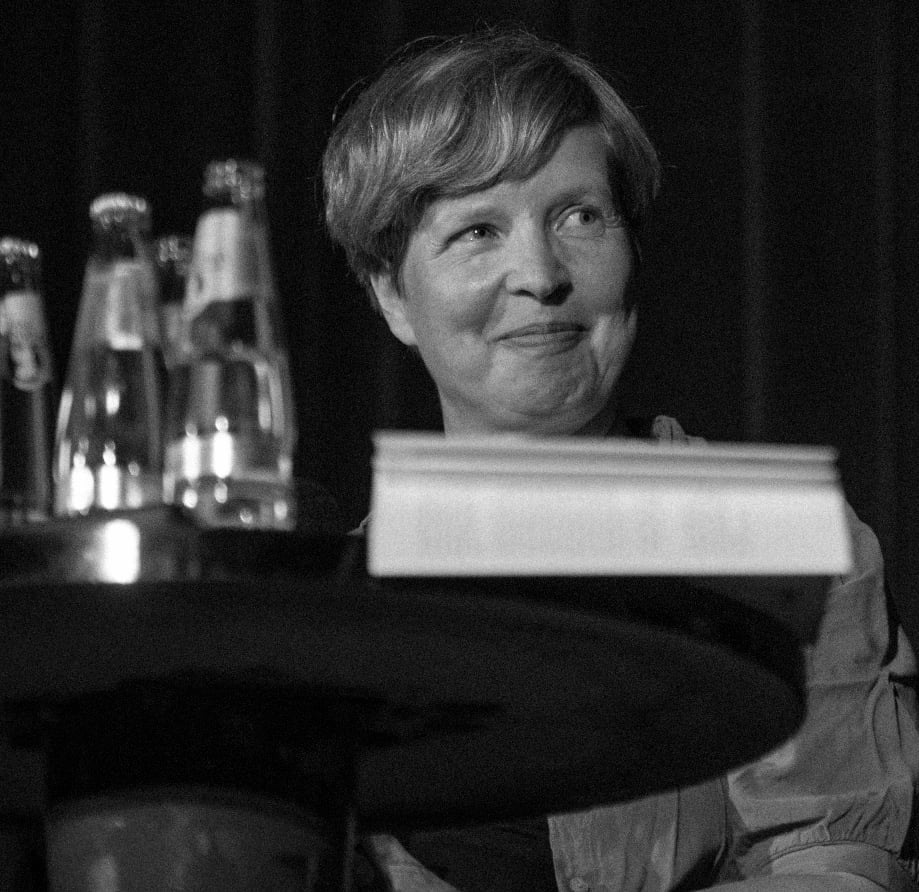
Jenny Erpenbeck
- Germany
- Zu Gast beim ilb: 2014, 2015, 2021
Jenny Erpenbeck was born in East Berlin in 1967. Both her grandparents, Hedda Zinner and Fritz Erpenbeck, as well as her parents, John Erpenbeck and Doris Kilias, were active in the literary world. Erpenbeck completed an apprenticeship as a bookbinder and worked in props at the Staatsoper in Berlin before studying theatre at Humboldt University and musical theatre production at the Hanns Eisler Academy of Music. She has produced pieces from the Baroque to the modern era as well as her own works at various opera houses and theatres in numerous cities.
Her debut as an author came in the form of the novella »Geschichte vom alten Kind« (1999; Eng. »The Old Child«, 2005). Critics particularly praised the peculiar language, oscillating between distance and introspection, with which Erpenbeck brought to life this contemporary female variation on the Kaspar Hauser myth. A stage adaptation celebrated its premiere at the Staatstheater Kassel in 2003. After the narrative volume »Tand« (2001; Eng. »Trinkets«, 2005), Erpenbeck published »Wörterbuch« (2004; Eng. »The Book of Words«, 2007) in which she explores the complex relationship between language and memory. While this novel takes place in a fictional place, »Heimsuchung« (2008; Eng. »Visitation«, 2010) is set in an actual house on the shores of a lake in Brandenburg, and tells a story stretching from WWI to the present. Her work »Dinge, die verschwinden« (2009; tr: Things That Are Disappearing) compiles a series of cameos that ironically and enigmatically illustrate the transience of everything that exists. Erpenbeck explored vanitas even more explicitly in her novel »Aller Tage Abend« (2012; Eng. »The End of Days«, 2014). In five hypothetical biographies of one character, the novel depicts the biographically far-reaching consequences of seemingly tiny deviations from actual events. As a result, the reader is given interpretive freedom to reflect on the fine line between coincidence and determinism. In »Gehen, ging, gegangen« (2015; Eng. »Go, Went, Gone«, 2017), she links social developments such as the refugee crisis with demographic change. The story follows an emeritus professor coping with the fact that his old life has come to an end as he meets African asylum seekers who have been waiting in Berlin for the new life they had hoped for to finally begin. In 2018, she released the essay collection »Kein Roman. Texte 1992 bis 2018« (Eng. »Not a Novel: A Memoir in Pieces«, 2020). The title of her current novel, »Kairos« (2021), alludes to the god of happy moments. Hans and Katharina meet by chance in East Berlin in the late eighties. Hans, fifty years old, is a writer, married, and has a son. Katharina, nineteen, is training to be a typesetter. Delving into the thoughts and feelings of her two main characters, Erpenbeck highlights a fine sense for inner stirrings, the dynamics of this special relationship, and, at the same time, a significant period of German history.
When Erpenbeck was awarded the Josef-Breitbach-Prize in 2013 for her complete literary works, it was stated that »Jenny Erpenbeck is an epic poet of the moment, in which the coincidences of a vita become fate.« In addition to numerous other awards, she was awarded the Order of Merit of the Federal Republic of Germany in 2017. Erpenbeck lives in Berlin.
Geschichte vom alten Kind
Eichborn
Frankfurt a. M., 1999
Tand
Eichborn
Frankfurt a. M., 2001
Wörterbuch
Eichborn
Frankfurt a. M., 2004
Heimsuchung
Eichborn
Frankfurt a. M., 2008
Dinge, die verschwinden
Galiani
Berlin, 2009
Aller Tage Abend
Knaus
München, 2012
Gehen, ging, gegangen
Knaus
München, 2015
Kein Roman
Texte und Reden 1992 bis 2018
Penguin
München, 2018
Kairos
Penguin
München, 2021
